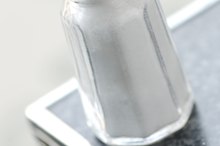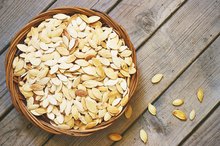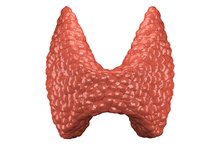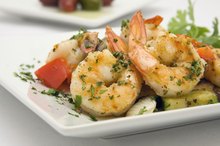What does fact checked mean?
At Healthfully, we strive to deliver objective content that is accurate and up-to-date. Our team periodically reviews articles in order to ensure content quality. The sources cited below consist of evidence from peer-reviewed journals, prominent medical organizations, academic associations, and government data.
- Linus Pauling Institute: Iodine
- National Endocrine and Metabolic Diseases Information Service: Hyperthyroidism
The information contained on this site is for informational purposes only, and should not be used as a substitute for the advice of a professional health care provider. Please check with the appropriate physician regarding health questions and concerns. Although we strive to deliver accurate and up-to-date information, no guarantee to that effect is made.
Can I Eat Seaweed If I Have Hyperthyroidism?
Your thyroid -- a small endocrine gland -- produces hormones necessary for growth and maintenance. Hyperthyroidism occurs when your thyroid produces more hormone than your body needs. If you have hyperthyroidism, you must be careful to avoid consuming too much iodine, a mineral your thyroid uses to produce thyroid hormones. Your physician can help determine whether you must limit seaweed consumption or avoid it altogether.
Read more about exercises to stimulate the thyroid.
Seaweed Precaution
Seaweed is particularly rich in iodine, more so than other foods 1. While the content varies greatly, a serving of seaweed may contain more than 4,500 micrograms of iodine. Most diets supply less than 1,000 micrograms daily. The recommended intake for adults is 150 micrograms daily. Eating too much dietary iodine can cause your thyroid to produce too much hormone, according to the National Endocrine and Metabolic Diseases Information Service. This can exacerbate your condition if you have hyperthyroidism. Only your doctor can determine how much, if any, seaweed is safe for you to eat.
Read more about natural remedies, vitamins and minerals for hyperthyroidism.
- Seaweed is particularly rich in iodine, more so than other foods 1.
- Only your doctor can determine how much, if any, seaweed is safe for you to eat.
Related Articles
References
- Linus Pauling Institute: Iodine
- American Thyroid Association. Iodine Deficiency. 2020.
- Eastman CJ, Zimmermann MB. The iodine deficiency disorders. In: Feingold KR, Anawalt B, Boyce A, et al., editors. Endotext. South Dartmouth, MA: MDText.com, Inc. Updated February 6, 2018.
- Ahad F, Ganie SA. Iodine, Iodine metabolism and Iodine deficiency disorders revisited. Indian J Endocrinol Metab. 2010;14(1):13-17.
- Kostoglou-athanassiou I, Ntalles K. Hypothyroidism - new aspects of an old disease. Hippokratia. 2010;14(2):82-87.
- American Thyroid Association. Hypothyroidism in Children and Adolescents. 2020.
- National Institutes of Health, Office of Dietary Supplements. Iodine. Updated July 9, 2019.
- U.S. National Library of Medicine. Congenital hypothyroidism. Updated February 11, 2020.
- Johnson LE. Iodine. Merck Manual Professional Version. Updated October 2018.
- Murthy MB, Krishnamurthy B. Severe irritant contact dermatitis induced by povidone iodine solution. Indian J Pharmacol. 2009;41(4):199-200. doi:10.4103/0253-7613.56069
- Puchalski AR, Chopra IJ. Radioiodine treatment of differentiated thyroid cancer despite history of 'iodine allergy'. Endocrinol Diabetes Metab Case Rep. 2014;2014:130084. doi:10.1530/EDM-13-0084
- Schabelman E, Witting M. The relationship of radiocontrast, iodine, and seafood allergies: a medical myth exposed. J Emerg Med. 2010;39(5):701-707. doi:10.1016/j.jemermed.2009.10.014
- National Institutes of Health, Office of Dietary Supplements. Iodine. Updated July 9, 2019.
- American Cancer Society. Radioactive Iodine (Radioiodine) Therapy for Thyroid Cancer. Updated March 14, 2019.
- Centers for Disease Control and Prevention. Potassium iodide (KI). Updated April 4, 2018.
- Kalra S, Unnikrishnan AG, Sahay R. The hypoglycemic side of hypothyroidism. Indian J Endocrinol Metab. 2014;18(1):1-3.doi:+10.4103/2230-8210.126517
Writer Bio
Janet Renee is a clinical dietitian with a special interest in weight management, sports dietetics, medical nutrition therapy and diet trends. She earned her Master of Science in nutrition from the University of Chicago and has contributed to health and wellness magazines, including Prevention, Self, Shape and Cooking Light.









